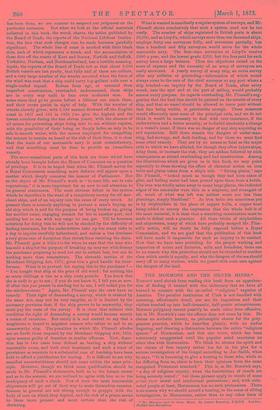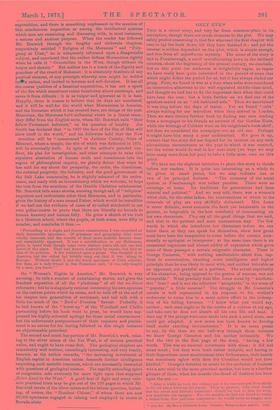THE MORMONS AND THE SILVER MINES.* NOBODY need shrink from
reading this book from an apprehen- sion of finding it tainted with the indecency that we have all learned to connect with the so-called "religious" vagaries of America. The peculiar institution of Utah is not handled with caressing, affectionate detail, nor are its impositors and their victims touched up into half-dramatic, half-poetic attractiveness. Mormon polygamy cannot possibly be made other than offensive, but in Mr. Bonwick's case the offence does not come by him. He claims no M3thetie beauty, no philosophic charm for the poly- gamous practice, which he describes plainly, with no undue lingering, and drawing a distinction between the entire "religious system" of Mormonism, and this one tenet, which has been notoriously exaggerated until the popular mind associates no other idea with Mormonism. We think he strains the spirit and the claims of free inquiry rather too far in his plea for a serious investigation of the Gospel according to Joe Smith, when he says, "It is becoming to give a hearing to those who, while so far differing from us, claim to form their opinions from the same recognised Protestant standard." This is, as Mr. Bonwick says, "a day of religious inquiry, when the foundations of creeds are being severely tested ;" but these phrases apply to creeds of some prima facie moral and intellectual pretensions ; and, with culti- vated people at least, Mormonism has no such pretensions. There is no reason why we should accord a hearing, in the sense of sifting investigation, to Mormonism, rather than to any other form of • The Mormons and the Silver Mines. By James Bonwiek, F.E.G.S. London: Hodder and Stoughton.
superstition, and there is something unpleasant in the mention of this mischievous imposition as among the intellectual systems which men are examining and discussing with, in most instances, a serious and anxious purpose. When the reader has followed Mr. Bonwick through the lengthy and elaborate chapters, respectively entitled "Religion of the Mormons" and "Poly- gamy at Utah," he is adequately informed upon a disagreeable subject, and convinced that the author defines Mormonism rightly when he calls it " Orientalism in the West, though without its torpor and slavery." But neither has it a touch of the dignity and grandeur of the creed of Mahomet ; it is absolutely destitute of any poetical element, of any principle whereby men might be welded int,rnation, and incited to heroism and self-devotion. It has all the coarse qualities of a fanatical superstition, it has not a spark of the fire which sometimes raises fanaticism above contempt, and saves it from ridicule ; it is as vulgar and ignorant as it is base. Happily, there is reason to believe that its days are numbered, and it will be well for the world when Mormonism in America, and the literature which it has created here, are things of the past. Meantime, the Mormons hold millennial views in a literal sense ; they differ from the English sects, whom Mr. Bonwick calls "their fellow-Protestant believers," on the question of locality. Joe Smith has declared that "in 1890 the face of the Son of Man will show itself in the world," and his followers hold that the New erusalem will be " commenced " in Jackson County, State of Missouri, where a temple, the site of which was dedicated in 1831, will be eventually built. In spite of the author's paraded can- dour, his plea for investigation, and other attempts to raise this repulsive aberration of human souls and consciences into the region of philosophical inquiry, we plainly detect that when he has said his say about the prosperity, the order, the cleanliness, the external propriety, the industry, and the good government of the Salt Lake community, he is slightly ashamed of his euthu- siasin, and ready with an inconsistency which we welcome, to hope the best from the exertions of the Gentile Christian missionaries. Mr. Bonwick tells some stories, amusing though sad, of "religious" impostors and enthusiasts other than Mormons, and in particular, gives the history of a man named Fisher, which would be incredible if we had not the evidence of cases of so-called witchcraft in our own police-courts to prove that there are literally no bounds to human knavery and human folly. He gives a sketch of his visit to a Mormon school, where the pupils, of both sexes, were fifty in number, and concludes it thus :—
"Proceeding to a slight and discreet examination, I was surprised at their lamentable ignorance. Of grammar and geography they were wholly innocent, and the results of their more humble lessons were not remarkably apparent. It was a mortification to my Melbourne pride to know that, though some were sixteen years old, not one had heard of the place. They had known Australia by repute, but had no idea of its position. A few ventured upon a guess. One thought it in America, but the oldest lad briskly sang out that it was along in Europe. Without doubt I saw the worst specimen of Utah schools; but then, as a lady friend in San Francisco said, 'it was only taught by a man, you know.'"
On "Woman's Rights in America," Mr. Bonwick is very amusing; he tells a number of entertaining stories, and gives the frankest exposition of all the " platforms " of all the soi-disant reformers ; but he is singularly reticent concerning his own opinions on the various points which he raises, and he tails off at the end of his chapter into generalities of sentiment, and tall talk with a little too much of the " Bird-o'-Freedom " flavour. Probably, if he had known of the " burst-up " of the Woodhull and Claflin partnership before his book went to press, he would have sup- pressed his highly-coloured apology for those social excrescences; but the unfortunate postponement of their exposure and punish- ment is no excuse for his having followed in this single instance an objectionable precedent.
The second and much less portion of Mr. Bonwick's work, relat- ing to the silver mines of the Far West, is of serious practical value, and ought to have come first. The geological chapters are remarkably well written, exceedingly interesting, and very timely, because, as the author remarks, "the increasing investment of English capital in American mines demands further intelligence respecting such metallic resources, which are necessarily connected with questions of geological science. The rapidly extending spirit of emigration asks anxiously for more light upon that supposed ,,Better Land in the West." A good deal of light and many valu- able practical hints may be got out of the 120 pages in which Mr. Bon wick treats of the silver mines and the labour question, includ- ing, of course, the "Heathen Chines," of whom there are now 30,000 specimens engaged in mining and employed in stores in Nevada alone.



































 Previous page
Previous page